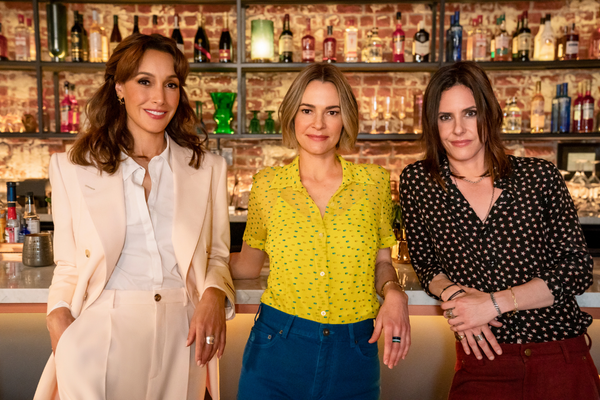Nineteen years ago this January, the landscape of lesbian representation on television changed forever when The L Word premiered on Showtime, and became the first television series to feature an ensemble cast of queer female characters. The show ran until 2009, and ultimately returned to Showtime in December 2019 with The L Word: Generation Q – another fast-paced drama with a diverse set of characters and the same heart as the original. With its third season which premiered November 18, here’s a look at the history of The L Word and The L Word: Generation Q, and their impact on representation and our community.
When The L Word premiered in January 2004, it wasn’t just that there hadn’t been a show dedicated to and written by queer women. The presence of LGBTQ+ representation in the media was sparse. According to GLAAD’s 2004 “Where We Are On TV” report, during the 2004-2005 primetime season there were only six broadcast TV shows with LGBTQ+ characters, which was the lowest number of gay characters GLAAD had found since it started tracking them in 1996. Similarly, The L Word was one of eight cable television shows with LGBTQ+ characters.
Given the limited number of LGBTQ+ characters in the media and the conversations around same-sex marriage that were percolating at the time, the impact of The L Word cannot be overstated, and The L Word didn’t shy away from controversial topics like Don’t Ask, Don’t Tell, and adoption for same-sex couples. At its core, the show was about lesbian drama, and as a result, queer women all over the world hosted watch parties for their friends to see it all unfold. In 2007, Ilene Chaiken, who was the creator of the show, also launched OurChart.com, a lesbian social networking site that was modeled after a relationship chart created by beloved character Alice Pieszecki (Leisha Hailey).
But the reception to The L Word was not all positive. While Shane and Alice quickly became fan favorites, Jenny Schecter (Mia Kirshner) was a polarizing character who died in the sixth and final season without an explanation of what happened to her until Generation Q premiered. Similarly, in season 3, the beloved Dana Fairbanks (Erin Daniels) passed away from breast cancer, a decision that Chaiken has explicitly said she regrets.
Perhaps the biggest qualms with the show have been about representation and the fact that the cast was predominantly white, feminine, and well-off. Others have rightly pointed out the show’s problematic depiction of transgender characters like Max (Daniel Sea), who was the first recurring trans man on television and was subject to many harmful tropes about trans people.
The L Word: Generation Q was created, in part, to address some of these missteps. When the show premiered in December 2019, it cast transgender actors such as Leo Sheng and Jamie Clayton to play Micah and Tess, respectively. And in terms of race, there are many more characters of color, including Sophie (Rosanny Zayas) and Pippa (Vanessa Estelle Williams) as well as Dani (Arienne Mandi) and Gigi (Sepideh Moafi), who are both of Iranian descent. And unlike the original series, which problematically cast some actresses who were not the same race as their characters, Mandi and Moafi are actually of Iranian descent.
Even with these improvements, Generation Q is not perfect. So far, we haven’t had any non-binary characters and though we’ve had transgender actresses, it appears that neither of them is playing an explicitly trans role.
In addition, the show’s depiction of polyamory leaves much to be desired, especially because it seems to be used more as plot device than an avenue for exploring questions about non-monogamy. During season two of Generation Q, many fans were also upset that Bette (Jennifer Beals) and Tina (Laurel Holloman) were not together, so much that they mobilized around the hashtag #IleneSavetheLWord.
At the end of the day, it’s impossible for any show to be perfect or to represent every kind of queer person or relationship that exists. And with so few shows with an ensemble queer female cast, if any, Generation Q faces some of the issues it did back in 2004 – that it must include everyone and everything.
With that said, what The L Word franchise will always have going for it is that it makes being a queer woman look “normal,” and that, in and of itself, will always be a gift.


